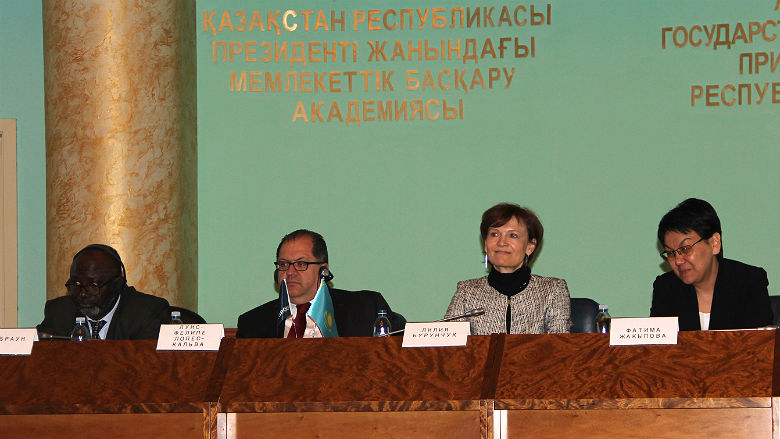ASTANA, May 16, 2017 – A new World Bank policy report was presented in Astana today, urging the country and international development agencies to rethink their approach to governance as a key to overcoming challenges related to security, growth, and equity.
The 2017 World Development Report: Governance and the Law explores how unequal distribution of power in a society interferes with the effectiveness of policies. Power asymmetries help explain, for example, why model anti-corruption laws and agencies often fail to curb corruption, why decentralization does not always improve municipal services, or why well-crafted fiscal policies may not reduce volatility or generate long-term savings.
The report notes that when policies and technical solutions fail to achieve intended outcomes, institutions often take the blame. However, it finds that countries and donors need to think more broadly to improve governance so that policies succeed. It defines better governance as the process through which state and non-state groups interact to design and implement policies, working within a set of formal and informal rules that are shaped by power.
During the event, representatives of three branches of power in Kazakhstan informed the public about the progress and challenges the country faces on its way toward building a Kazakhstani model of good governance. Think tanks and academicians, as well as non-governmental and international organizations, also joined the discussion.
“Kazakhstan managed to translate its economic growth into improved standards of living for its people. However, to sustain this progress and overcome the current economic downturn, a number of governance challenges and gaps need to be addressed, as this can potentially undermine the sustainability of the development process,” says Lilia Burunciuc, World Bank Country Director for Central Asia.
Based on extensive research and consultations in many countries over the past two years, the report proposes principles to guide reform and change the dynamics of governance for equitable development.
Luis Felipe Lopez-Calva, World Bank Poverty and Equity Practice Manger and co-author of the report, highlighted that in order to produce better governance outcomes, institutions need to:
- Bolster commitment to policies in the face of changing circumstances. This would help, for example, in cases where decision makers spend windfall revenues instead of saving them for the future, or when leaders renege on peacebuilding agreements in the absence of binding enforcement.
- Enhance coordination to change expectations and elicit socially-desirable actions by all. Challenges occur in many contexts - from finance to industrial clusters and urban planning. Financial stability, for example, relies on beliefs about credibility. Just consider how, despite the rationale for leaving their money in the bank during times of distress, the public may rush to withdraw their deposits if they believe that others will too – ultimately causing the banks to lose liquidity and crash.
- Encourage cooperation: Effective policies help promote cooperation by limiting opportunistic behavior such as tax evasion- often through credible mechanisms of rewards or penalties. Individuals may have incentives to behave opportunistically.
According to the report, unequal distribution of power can exclude groups and people from the rewards and gains of policy engagement. Yet meaningful change is possible with the engagement and interaction of citizens, through coalitions to change the incentives of those who make decisions; elites, through agreements among decision makers to restrict their own power; and the international community, through indirect influence to change the relative power of domestic reformers.
As the report notes, successful reforms are not just about “best practice.” They require adapting and adjusting institutions in ways that build more effectively on local dynamics and address specific problems that continue to stand in the way of development that serves all citizens.

